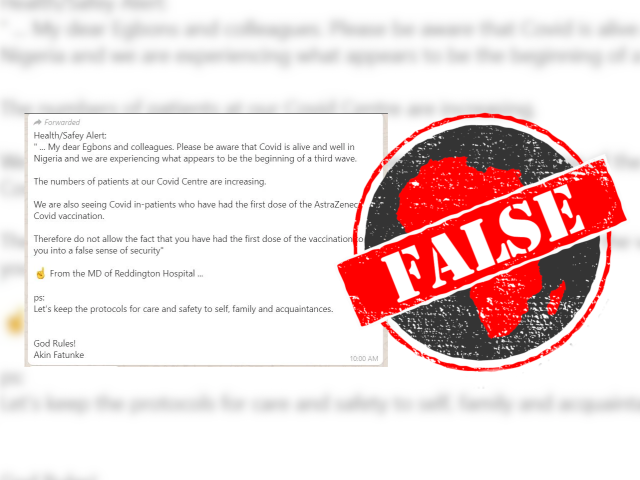IN SHORT: An image circulating on Facebook appears to show Kenya’s former electoral commission chair Wafula Chebukati on a hospital bed. It is accompanied by a claim that he is sick and hospitalised. But the image has been photoshopped.
An image that seems to show the former chair of Kenya's Independent Electoral and Boundaries Commission (IEBC), Wafula Chebukati, in hospital is making the rounds on Facebook.
In the image, he is seen smiling at the camera while being attended to by a nurse.
The IEBC is responsible for conducting elections in the country.
The image has been posted in different Facebook pages and groups, all with the same basic claim that Chebukati is sick. Some of the captions include:
- Former IEBC chairman Wafula Chebukati Airlifted to Germany for further treatment.
- Former IEBC Chairperson Wafula Chebukati has been moved from Nairobi Hospital to Aga Khan University Hospital. The ex-IEBC chair is said to be suffering from an unknown illness.
- Please let's wish Wafula chebukati quick recovery.
As IEBC chair, Chebukati faced controversy, especially from supporters of opposition leader Raila Odinga.
He oversaw the August 2022 general elections where Odinga and Kenyan president William Ruto were the main contenders.
The former chair declared Ruto as the winner but Odinga challenged the results in court, claiming the elections had been rigged. However, Kenya's supreme court rejected claims of vote rigging. Odinga still led countrywide demonstrations challenging the legitimacy of Ruto and his government. Odinga even called for Chebukati’s prosecution.
The integrity of the election continues to be questioned on social media with frequent rumours of Chebukati being either seriously ill or dead.
The image from hospital has also been posted here and here. (Note: See more instances listed at the end of this report.)
But is the image evidence that Chebukati is sick? We checked.

Photo altered
As a public figure, news of Chebukati’s deteriorating health would be likely to be reported on by the mainstream media. Even in instances where prominent figures try to keep their failing health a secret, the news often still reaches the public through mainstream media.
We scoured the internet for any reliable reports about Chebukati’s health but came up empty.
A reverse image search reveals the original photo was posted by MP Shah Hospital, a private hospital in Nairobi, Kenya.
It is not captioned, but the man pictured is not Chebukati. His face has been superimposed on to the original photo. The original has also been flipped – the nurse stands to the right of the hospital bed in the original photo, but is shown to the left in the photoshopped version featuring Chebukati.
What look like packets of medicine on shelves in the back- and foreground have also been added to the viral image.
High-profile figures are frequently the target of false allegations and that is the case here. The photo was altered and Chebukati’s face added.
The falsified image was also posted here, here, here, here, here, here and here.
Republish our content for free
For publishers: what to do if your post is rated false
A fact-checker has rated your Facebook or Instagram post as “false”, “altered”, “partly false” or “missing context”. This could have serious consequences. What do you do?
Click on our guide for the steps you should follow.
Publishers guideAfrica Check teams up with Facebook
Africa Check is a partner in Meta's third-party fact-checking programme to help stop the spread of false information on social media.
The content we rate as “false” will be downgraded on Facebook and Instagram. This means fewer people will see it.
You can also help identify false information on Facebook. This guide explains how.



Add new comment